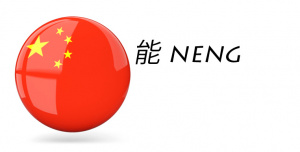Difference between revisions of "Language/Mandarin-chinese/Vocabulary/能-néng"
< Language | Mandarin-chinese | Vocabulary
Jump to navigation
Jump to search
| Line 2: | Line 2: | ||
<div style="font-size:250%;">How to use <span class="notranslate">能 néng</span></div> | <div style="font-size:250%;">How to use <span class="notranslate">能 néng</span></div> | ||
你好 Chinese learners, | |||
In today's lesson, we will teach you how to use the Chinese verb <span class="notranslate">能 néng</span>. | In today's lesson, we will teach you how to use the Chinese verb <span class="notranslate">能 néng</span>. | ||
Revision as of 12:09, 22 August 2020
How to use 能 néng
你好 Chinese learners,
In today's lesson, we will teach you how to use the Chinese verb 能 néng.
Feel free to edit this wiki page, if you think it can be improved.
能 néng indicates the ability to do something:
- 我能打電話。/我能打电话。 Wǒ néng dǎ diànhuà
I can call. (I am able do it.)
There is a nuance with 會/会 huì “know how to do something”, even if the use is sometimes very close:
- 我能說話。/我能说话。Wǒ néng shuō huà
I can speak (because I have the physical capacity: mouth, tongue, etc.).
- 我會說話。/我会说话。Wǒ huì shuōhuà
I can speak (because I have learned it).
我会说话 is a know-how and in this sense the sentence is also understood by the eloquence: "I know how to speak well."
能 néng also indicates permission:
- 我能不能去看他? Wǒ néng bù néng qù kān tā?
Can I go see him?
- 不能。 Bù néng
No.
Sources
http://www.chine-culture.com/chinois/cours-de-chinois-6-grammaire.php
